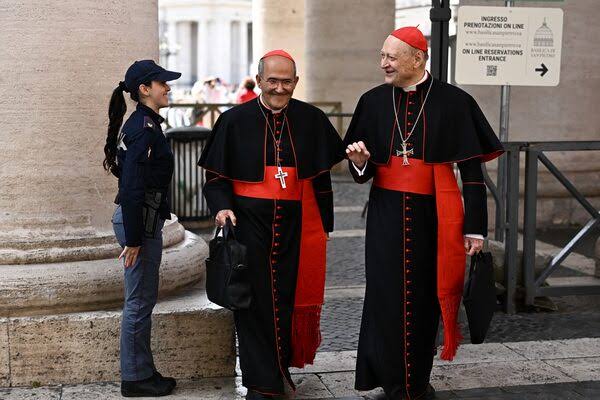Cardinals who will participate in the secret conclave to elect the next Catholic pope began arriving at two Vatican hotels on Tuesday. During the conclave, they will be sequestered and prohibited from communicating with the outside world as they deliberate on who will succeed Pope Francis.
The conclave is scheduled to begin behind closed doors in the Sistine Chapel on Wednesday afternoon. All cardinals under the age of 80 are eligible to vote for the next leader of the 1.4 billion-member Church.
The selection of a successor to Francis, who passed away last month, is considered to be wide open. While a few names have been mentioned as potential frontrunners, several of the 133 cardinals expected to vote have stated that they do not know who the next pope will be.
“I have no guess,” said Cardinal Robert McElroy during a visit to a parish in Rome on Monday evening.
McElroy, the archbishop of Washington, D.C., described the conclave process as “profound and mysterious.” “I can give you no insights into who is ahead,” he added.
Some cardinals are seeking a new pope who will continue Francis’ efforts to promote a more transparent and welcoming Church, while others are advocating for a return to more traditional principles that prioritize doctrine.
Read more: China to Japan: Fight US Tariffs
Conclaves typically span several days, involving multiple rounds of voting until a candidate secures the required three-quarters majority to become pope.
During the conclave, the voting cardinals will reside in two Vatican guesthouses and take an oath to maintain complete secrecy and avoid contact with anyone not involved in the voting process.
Pope Francis prioritized appointing cardinals from countries that had never previously had them, including Haiti, South Sudan, and Myanmar.
This conclave will be the most geographically diverse in the Church’s 2,000-year history, with clerics from 70 countries participating.
Japanese Cardinal Tarcisio Isao Kikuchi told La Repubblica newspaper that many of the 23 cardinals from Asia planned to vote as a bloc.
He contrasted their approach with that of the 53 cardinals from Europe, who are known to vote based on individual countries or personal preferences.
“We Asians are probably more unanimous in supporting one or two candidates … we will see which name will come out as the leading candidate,” said Kikuchi.



